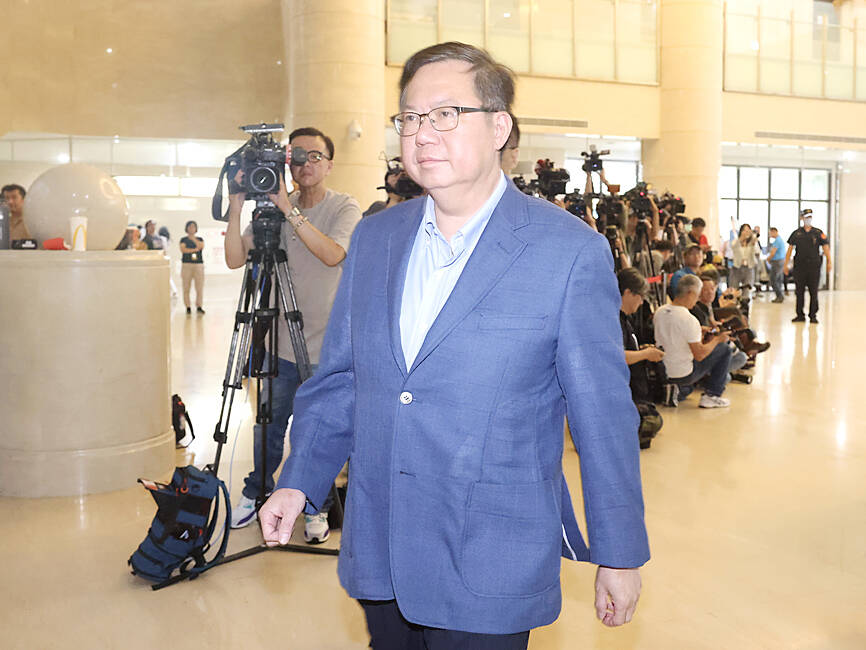The Taoyuan District Court yesterday ordered the detention of former vice premier Cheng Wen-tsan (鄭文燦), who is being investigated for alleged corruption while serving as Taoyuan mayor from December 2014 to December 2022, and that he be held incommunicado.
The court made the ruling during a bail hearing after prosecutors appealed its bail ruling twice.
Cheng on Saturday was released after posting bail of NT$5 million (US$153,818).

Photo: CNA
However, after prosecutors lodged an appeal, the High Court on Monday revoked the original ruling and ordered the Taoyuan District Court to hold another bail hearing.
On Tuesday, the district court granted bail to Cheng a second time after again rejecting a detention request.
Cheng was released by the district court for a second time on bail of NT$12 million after he paid NT$7 million late on Tuesday to add to the earlier NT$5 million payment.
Prosecutors appealed the second ruling at the bail hearing.
After the ruling, the Democratic Progressive Party’s Anti-corruption Committee announced that Cheng’s party membership would be suspended for three years starting today.
Cheng’s lawyer said that he would appeal the latest bail decision.
The High Court in its revocation of the second bail ruling said there were several unanswered questions left by the district court in allowing bail, including why it overlooked the possibility of collusion between Cheng and others, as well as Cheng’s substantial influence in the Taoyuan City Government.
The High Court said that collusion was still likely, as several suspects were released or granted bail after being questioned by prosecutors.
Cheng is well-connected in Taiwanese politics and business circles, which shows he has high political status and social influence, which would make it easy for him to collude with others, it said.
The district court on Tuesday said in a statement that it found no evidence to justify detaining Cheng, as he left his post as Taoyuan mayor more than 18 months ago and it is doubtful he still has influence in the city government.
The district court said that four other suspects have been detained, with only one suspect, an elderly man, granted bail, so there is little possibility they would collude with Cheng.
The case came to light on Friday last week, when Cheng was summoned by the Taoyuan District Prosecutors’ Office as part of an investigation into alleged corruption involving a land zoning deal while he was mayor of Taoyuan.
After questioning him, prosecutors said that they suspected Cheng of having accepted a bribe, leaked information to other suspects in the case and laundered money.
The prosecutors filed a motion to detain and hold him incommunicado.
After serving as Taoyuan mayor, Cheng became vice premier in January last year and stayed in the post until May 20, when he was appointed chairman of the Straits Exchange Foundation.
He stepped down from his foundation post on Sunday.

AIR SUPPORT: The Ministry of National Defense thanked the US for the delivery, adding that it was an indicator of the White House’s commitment to the Taiwan Relations Act Deputy Minister of National Defense Po Horng-huei (柏鴻輝) and Representative to the US Alexander Yui on Friday attended a delivery ceremony for the first of Taiwan’s long-awaited 66 F-16C/D Block 70 jets at a Lockheed Martin Corp factory in Greenville, South Carolina. “We are so proud to be the global home of the F-16 and to support Taiwan’s air defense capabilities,” US Representative William Timmons wrote on X, alongside a photograph of Taiwanese and US officials at the event. The F-16C/D Block 70 jets Taiwan ordered have the same capabilities as aircraft that had been upgraded to F-16Vs. The batch of Lockheed Martin

GRIDLOCK: The National Fire Agency’s Special Search and Rescue team is on standby to travel to the countries to help out with the rescue effort A powerful earthquake rocked Myanmar and neighboring Thailand yesterday, killing at least three people in Bangkok and burying dozens when a high-rise building under construction collapsed. Footage shared on social media from Myanmar’s second-largest city showed widespread destruction, raising fears that many were trapped under the rubble or killed. The magnitude 7.7 earthquake, with an epicenter near Mandalay in Myanmar, struck at midday and was followed by a strong magnitude 6.4 aftershock. The extent of death, injury and destruction — especially in Myanmar, which is embroiled in a civil war and where information is tightly controlled at the best of times —

Taiwan was ranked the fourth-safest country in the world with a score of 82.9, trailing only Andorra, the United Arab Emirates and Qatar in Numbeo’s Safety Index by Country report. Taiwan’s score improved by 0.1 points compared with last year’s mid-year report, which had Taiwan fourth with a score of 82.8. However, both scores were lower than in last year’s first review, when Taiwan scored 83.3, and are a long way from when Taiwan was named the second-safest country in the world in 2021, scoring 84.8. Taiwan ranked higher than Singapore in ninth with a score of 77.4 and Japan in 10th with

SECURITY RISK: If there is a conflict between China and Taiwan, ‘there would likely be significant consequences to global economic and security interests,’ it said China remains the top military and cyber threat to the US and continues to make progress on capabilities to seize Taiwan, a report by US intelligence agencies said on Tuesday. The report provides an overview of the “collective insights” of top US intelligence agencies about the security threats to the US posed by foreign nations and criminal organizations. In its Annual Threat Assessment, the agencies divided threats facing the US into two broad categories, “nonstate transnational criminals and terrorists” and “major state actors,” with China, Russia, Iran and North Korea named. Of those countries, “China presents the most comprehensive and robust military threat